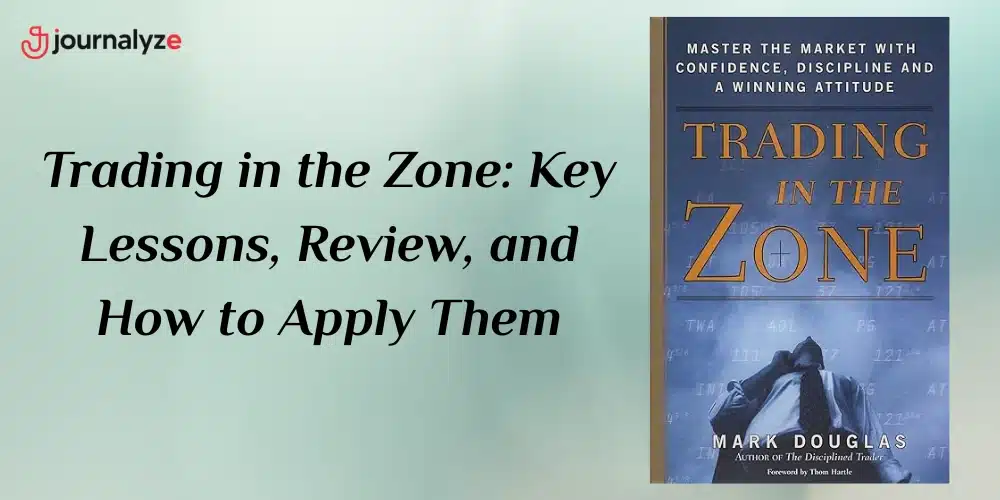
Trading in the Zone: Key Lessons, Review, and How to Apply Them
Trading in the Zone by Mark Douglas is one of the most powerful books on trading psychology ever written. It addresses the mental and emotional side of trading—an area often overlooked by even the most technically skilled traders.
In this blog, we’ll break down the core lessons from the book, explore how it compares to other trading psychology texts, and show how tools like trading journal software and day trading analysis tools can help implement its principles.
Who Is Mark Douglas and Why Should You Listen?
Mark Douglas was a pioneer in trading psychology. Long before “mindset” became a buzzword, Douglas emphasized that a trader’s mental state is more important than their strategy. His experience working with traders, brokers, and fund managers helped him shape a deep understanding of the psychological roadblocks that derail performance
What Is Trading in the Zone About?
The book digs into the mental habits, beliefs, and emotional patterns that sabotage traders—often without them realizing it. Douglas poses a crucial question:
“Why do traders struggle to do what they already know they should do?”
His answer lies in cultivating a mindset rooted in:
- Probabilistic thinking
- Emotional discipline
- Self-trust over outcome obsession
Chapter Highlights – Trading in the Zone at a Glance
- The Road to Success – Foundations of Trading Psychology
- The Holy Grail Myth – Why strategy alone isn’t enough
- Accountability – Owning all outcomes, win or lose
- Consistency Is Mental – Not procedural
- The Nature of Perception – How beliefs distort decisions
- Thinking in Probabilities – Embracing uncertainty
- The Trader’s Edge – Emotional neutrality and discipline
Each chapter aligns well with day trading journal software and analytics tools that help traders reflect, track emotions, and optimize performance.
Why Trading in the Zone Is a Must-Read
- It shifts your focus from outcomes to process
- It helps detach emotion from trading decisions
- It complements tools like online trading journals
- It addresses mindset—often the missing link in strategy
Douglas argues that poor execution—not poor strategy—is the real reason most traders fail. Fear, overconfidence, or revenge trading are emotional patterns that Trading in the Zone helps you confront.
Top Lessons to Apply to Your Trading
1. Accept the Risk
Successful traders don’t fear loss—they accept it as part of the game.
Use trading journal software to log emotional reactions and recognize fear-based decisions.
2. Think in Probabilities
No single trade defines your success. Consistency matters more than winning.
A trading journal helps reinforce probabilistic thinking through pattern recognition.
3. Detach from the Outcome
You can execute a perfect trade and still lose. Focus on the quality of your process.
Analyze longer-term data with your day trading journal instead of reacting to short-term outcomes.
4. Reprogram Limiting Beliefs
Beliefs like “I must win every trade” will sabotage you. Replace them with beliefs that support learning, patience, and execution.
Journaling tools can help track belief changes over time.
Common Mistakes Trading in the Zone Helps Fix
- Overtrading after a loss
- Abandoning your strategy mid-trade
- Avoiding stop-losses due to fear of being wrong
- Measuring self-worth based on trade outcomes
Solution: Use a digital trading journal and analytics tool to reflect, track, and adjust these behaviors over time.
Trading in the Zone vs. The Disciplined Trader
Douglas’s earlier book, The Disciplined Trader, introduced many of these psychological ideas, but Trading in the Zone is deeper, more practical, and mindset-focused. It’s the better choice for traders looking to combine psychology with journaling and trade analysis tools.
Best Quotes from Trading in the Zone
“The best traders aren’t afraid.”
“You don’t need to know what’s going to happen next to make money.”
“Anything can happen.”
“There’s a random distribution between wins and losses.”
These quotes hit harder when you reflect on them after a trading session—especially in your online trading journal.
Who Should Read Trading in the Zone?
- Day traders, swing traders, and long-term investors
- Technically skilled but emotionally inconsistent traders
- Anyone using online trading software and seeking a performance edge through mindset mastery
- Traders integrating journaling, analytics, and self-improvement
Final Thoughts on Trading in the Zone
If you’re struggling with consistency, sabotaging your trades, or unsure how to improve, Trading in the Zone offers the mindset shift you need. Paired with tools like day trading journal software, online trading software, and trading analytics platforms, this book becomes a true force multiplier in your journey to trading success.
Frequently Asked Questions
Q: Is Trading in the Zone good for beginners?
A: Yes, especially for those who know the strategy but struggle with discipline and execution.
Q: How can I apply the book’s principles in real-time?
A: Use a trading journal to record your decisions, emotional patterns, and reactions after each trade.
Q: Can it help improve my trading performance?
A: Indirectly, yes. It improves mental discipline, reduces emotional errors, and enhances consistency—leading to better long-term results.
